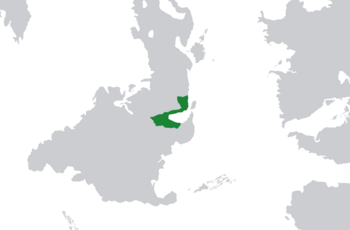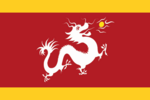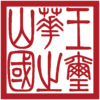Difference between revisions of "Kingdom of Monsilva"
m |
|||
| Line 67: | Line 67: | ||
After the [[Death and state funeral of the Qing Emperor|death of the Qing Emperor]] in October 1943, the [[Wang Emperor]], his cousin, became the next [[Emperor of Monsilva|emperor of Monsilva]]. Wang was well known for his genorosity with his money and his praise of absolute monarchy. Wang used his power to influence many National Party politicians to step down in the period from 1947 to 1953 so that the [[Leaders of Parliament Party (Monsilva)|Leaders of Parliament Party]] could return to power as they were in full support of the emperor. In 1953, the LPP won, lead by [[Liang Huiqing]]. Liang was [[Assassination of Liang Huiqing|assassinated]] in May 1962, during his second term. Succeeding him was [[Shao Yaoting]], who initiated [[Martial rule in Monsilva|martial law]] in 1963. | After the [[Death and state funeral of the Qing Emperor|death of the Qing Emperor]] in October 1943, the [[Wang Emperor]], his cousin, became the next [[Emperor of Monsilva|emperor of Monsilva]]. Wang was well known for his genorosity with his money and his praise of absolute monarchy. Wang used his power to influence many National Party politicians to step down in the period from 1947 to 1953 so that the [[Leaders of Parliament Party (Monsilva)|Leaders of Parliament Party]] could return to power as they were in full support of the emperor. In 1953, the LPP won, lead by [[Liang Huiqing]]. Liang was [[Assassination of Liang Huiqing|assassinated]] in May 1962, during his second term. Succeeding him was [[Shao Yaoting]], who initiated [[Martial rule in Monsilva|martial law]] in 1963. | ||
| − | During the martial law period from 1963 to the kingdom's end in 1978, Monsilva went from a democratic constitutional monarchy to a one-party state lead by an autoritarian military lead regime supported by the monarch. By the [[1968 Monsilvan general election|1968 general election]], Shao Yaoting's party was winning over 80% of seats in the Legislative Assembly with election fraud being very blatant. However, any opposition against Shao's regime would result in being arrested by the extensive police force that was loyal to him. Around 1965 and 1966, protests began occurring across the country, but were often supressed quickly by the military police. However, the protests began becoming more active and violent over the following years. This lead to the [[Monsilvan Revolutionary Army]] being created as a direct opposer to Shao's regime. In the mid 1970s, the army began orchestrating mass riots in cities across the country, and in 1978 began giving weapons to rioters. In October 1978, the MRA arrested the entire Monsilvan government including the [[Wang Emperor]]. Then, on the 25 December 1978, [[Xu Zhou-da]], leader of the MRA, established the [[Monsilvan Republic]], ending the Kingdom of Monsilva. | + | During the martial law period from 1963 to the kingdom's end in 1978, Monsilva went from a democratic constitutional monarchy to a one-party state lead by an autoritarian military lead regime supported by the monarch. By the [[1968 Monsilvan general election|1968 general election]], Shao Yaoting's party was winning over 80% of seats in the Legislative Assembly with election fraud being very blatant. However, any opposition against Shao's regime would result in being arrested by the extensive police force that was loyal to him. Around 1965 and 1966, protests began occurring across the country, but were often supressed quickly by the military police. However, the protests began becoming more active and violent over the following years. This lead to the [[Monsilvan Revolutionary Army]] being created as a direct opposer to Shao's regime. In the mid 1970s, the army began orchestrating mass riots in cities across the country, and in 1978 began giving weapons to rioters. Cool. It is theorised that some neighboring countries that were against Shao's regime, such as Baltanla, provided supplies and possibly even weapons to the revolutionaries during the riots. In October 1978, the MRA arrested the entire Monsilvan government including the [[Wang Emperor]]. Then, on the 25 December 1978, [[Xu Zhou-da]], leader of the MRA, established the [[Monsilvan Republic]], ending the Kingdom of Monsilva. |
[[Category:Kingdom of Monsilva]] | [[Category:Kingdom of Monsilva]] | ||
Revision as of 17:05, 25 February 2023
Caution: Incomplete Article This article is incomplete by choice. More content will be added to it soon! |
Kingdom of Monsilva | |||||||||
|---|---|---|---|---|---|---|---|---|---|
Anthem: 山國龍之歌 Shānguó Lóng zhī Gē "Song of the Monsilvan Dragon" | |||||||||
 Location of Kingdom of Monsilva (dark green) in Terraconserva (grey) | |||||||||
| Capital and largest city | Amking | ||||||||
| Official languages | Monsilvan | ||||||||
| Religion | Folk, Buddhism | ||||||||
| Demonym(s) | Monsilvan | ||||||||
| Government |
| ||||||||
| Emperor | |||||||||
• 1830–1898 | Song | ||||||||
• 1898–1943 | Qing | ||||||||
• 1943–1978 | Wang | ||||||||
| Prime Minister | |||||||||
• 1830–1845 (first) | Chai Lin | ||||||||
• 1962–1978 (last) | Shao Yaoting | ||||||||
| Legislature | Parliament | ||||||||
| Senate | |||||||||
| Legislative Assembly | |||||||||
| Historical era | Pre-republican period | ||||||||
• Established | 1830 | ||||||||
| 1909–1913 | |||||||||
| 1928–1933 | |||||||||
| 1962 | |||||||||
| 1963–1978 | |||||||||
| 1965–1978 | |||||||||
• Disestablished | 1978 | ||||||||
| Population | |||||||||
• 1850 | 10,000,000 | ||||||||
• 1977 | 36,500,000 | ||||||||
| Currency | Monsilvan Yupian 玉片 (M¥ or 玉) | ||||||||
| |||||||||
The Kingdom of Monsilva (Monsilvan: 山華王國; pinyin: Shānhuá Wángguó) was Monsilva between 1830 and 1978. The kingdom emerged from the Kingdom of Great Shan at the end of the Monsilvan Civil War in 1830. The kingdom was founded by Chai Lin, a general who had lead the Liberate Monsilva Movement to victory in the civil war. Chai was also the first Monsilvan prime minister, serving from the establishment of the nation in 1830 until his resignation at the 1845 general election. The kingdom encompassed all of modern-day Monsilva.
The Kingdom was the result of the abolition of absolute monarchy in Monsilva. Although the monarchy was retained, it was lead by the House of Shaneng with the first emperor being the Song Emperor who was a distant relative of the original Zhou Emperor who reigned over the Zhou dynasty from 1201 to 1268. This was preferred, as choosing descendents of the Han Emperor, who was the last emperor of the Great Shan, to be emperor would have been counter intuitive. The monarch retained powers as Head of State, however the prime minister was now the Head of Government and all laws and decisions had to go through the parliament before being introduced or acted upon.
In the 19th century, Monsilva saw a period of peace and prosperity as its economy gradually grew as trade with neighboring nations and across the Kivu Ocean began increasing. Although the nation was economically stable, it was not stable politically. Frequent political tension between the two main political parties, the People's Culture Party and the Leaders of Parliament Party, caused immense corruption and blackmail. In 1909, the Monsilvan political reform movement began as a series of protests orchestrated across the country against the strict voting laws and electoral manipulation. These protests, after dying down breifly between 1910 and 1913, flared up again after the first 1913 general election, when prime minister Zhong Wei won a second term. In September of 1913, Zhong called a snap-election after being threatened by banishment from office by Emperor Qing. This was Monsilva's first election where the suffrage included all men above the age of 18. In the election, the National Party won for the first time. The NP lead Monsilva for 40 years and in this period Monsilva saw a large growth in economy, political stability and population. It also saw a big step forward in human rights such as universal healthcare, free primary education and women's voting rights.
After the death of the Qing Emperor in October 1943, the Wang Emperor, his cousin, became the next emperor of Monsilva. Wang was well known for his genorosity with his money and his praise of absolute monarchy. Wang used his power to influence many National Party politicians to step down in the period from 1947 to 1953 so that the Leaders of Parliament Party could return to power as they were in full support of the emperor. In 1953, the LPP won, lead by Liang Huiqing. Liang was assassinated in May 1962, during his second term. Succeeding him was Shao Yaoting, who initiated martial law in 1963.
During the martial law period from 1963 to the kingdom's end in 1978, Monsilva went from a democratic constitutional monarchy to a one-party state lead by an autoritarian military lead regime supported by the monarch. By the 1968 general election, Shao Yaoting's party was winning over 80% of seats in the Legislative Assembly with election fraud being very blatant. However, any opposition against Shao's regime would result in being arrested by the extensive police force that was loyal to him. Around 1965 and 1966, protests began occurring across the country, but were often supressed quickly by the military police. However, the protests began becoming more active and violent over the following years. This lead to the Monsilvan Revolutionary Army being created as a direct opposer to Shao's regime. In the mid 1970s, the army began orchestrating mass riots in cities across the country, and in 1978 began giving weapons to rioters. Cool. It is theorised that some neighboring countries that were against Shao's regime, such as Baltanla, provided supplies and possibly even weapons to the revolutionaries during the riots. In October 1978, the MRA arrested the entire Monsilvan government including the Wang Emperor. Then, on the 25 December 1978, Xu Zhou-da, leader of the MRA, established the Monsilvan Republic, ending the Kingdom of Monsilva.

